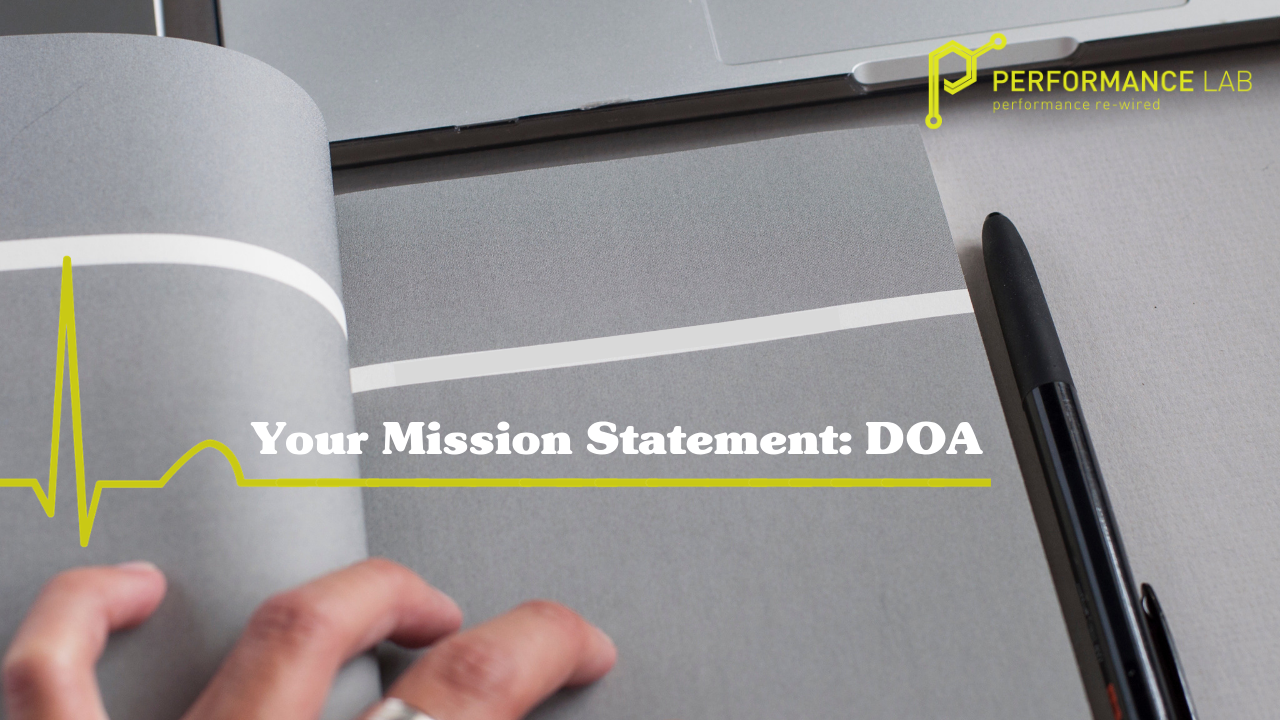Your Mission Statement: DOA
Why your mission statement is most likely dead on arrival.
We recently read a great article by Dan Palotta written on the HBR website. It was titled “Do you have a mission statement or are you on a mission?” It talked about the difference between actually creating a mission for everything that you do in your business as opposed to having a mission statement borne out of marketing and PR fluff that seems to be required in today’s workplace. Now, don’t get me wrong, I believe that most people have the best intentions when they create a mission statement, but I also believe that our notions of what they should be are greatly misunderstood. This isn’t just another blog about what mission statements should include, instead I am going to focus on the language that people use and how it affects our ability to perform.
Forgettable.
At least 90% of people that I talk to can’t tell me what their company’s mission statement is. This is a red flag that will tell you right away that your mission statement might as well be put in the round file. We know that mission statements are supposed to inspire people and to guide their work – maybe even give them a purpose to turn up every day – but the vast majority of them don’t do that. A great summary of what people generally do wrong is portrayed in this terrific video (how to write a mission statement that doesn’t suck).
But I am going to focus on one aspect – language – and how it affects our ability to perform. For some reason, when teams get into planning mode they get possessed by business-speak garbage. I don’t know what it is, but they start using all the phrases that they would otherwise ridicule and become so formal that their statements lose any impact they might have had. I’ll give you some examples that I’ve heard recently:
Instead of saying, “We set expectations and honour our commitments”
Why don’t they say, “We do what we say we’re going to do”?
Instead of saying, “We strive to deliver the best possible solutions for our clients so that they may caplitalise on opportunities”
Why not, “We’ll help you build a great business”?
What does this formality do to performance?
Well you can argue as much as you want about people not being able to connect with this sort of thing, that they won’t remember it because it is too wordy, and that they won’t honour it because it sounds clunky and foreign. These are all true. But there is something else at work that can make this sort of language damage performance.
When we get into this clinical, formal mode of language, we tend to switch on the ‘analytical’ part of our brain. The problem with this is twofold: 1) When this part of the brain is active our ‘creative’ part turns off. And knowing that creative thinking is our greatest competitive advantage in the information/knowledge economy, this isn’t really what we want to do now, is it? And 2) when we switch on the analytical part of our brain, our emotional centre tends to switch off. In fact, to control emotions and anxiety one of the best things we can do is to do something analytical, like finding a succinct name for the emotion. Is it any wonder, then, why these sort of formal, business-speak mission statements fail to make an emotional connection with their readers?
The next time that you find yourself with your team writing a new mission statement or vision, let your guard down. Tell them to stop talking like the CEO and start talking like themselves. You will be amazed at how they let their guard down and the amount of connection and emotional investment you get from that point on. You will literally see their burden lift and their engagement soar.
** Tony Wilson is a Workplace Performance Expert. His insights into performance science and its application in the workplace will make you re-think the way that you approach leadership, culture change, high performance and productivity. Tony has an MBA and a BSc majoring in physiology and delivers workshops and keynote presentations around the globe.
